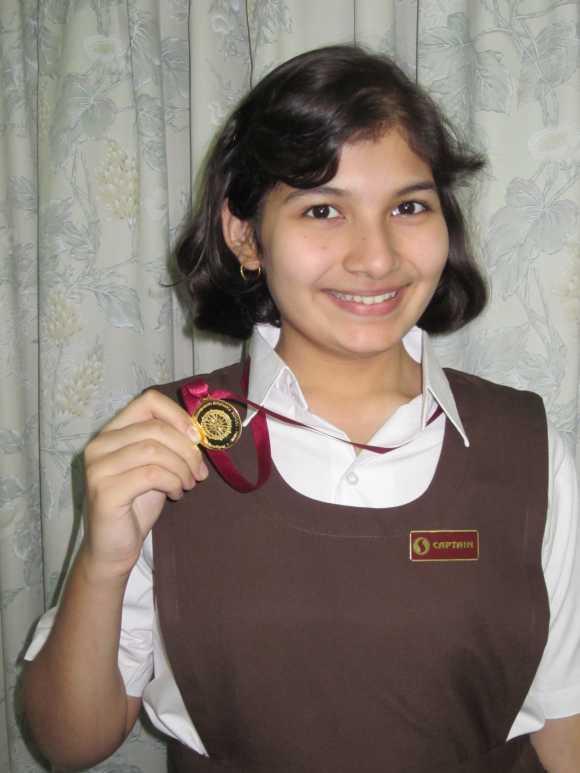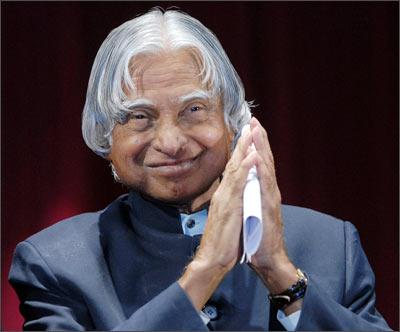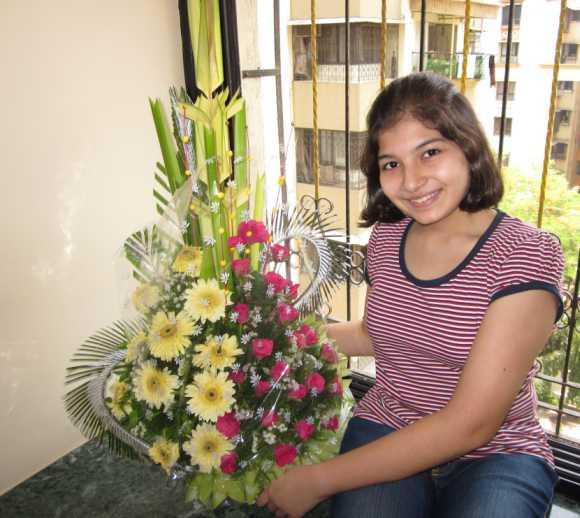
Shalaka Kulkarni from Thane, who topped the Class 10 ICSE exam stresses on the importance of time management and insists that self-study is the best way to prepare.
Fifteen-year-old Shalaka Kulkarni is among the rare breed of toppers who believes in the magic of self-study over private coaching.
The all-India ICSE topper from Smt Sulochanadevi Singhania School, Thane, who clinched first place with 98.80 per cent this year, credits her success to the efforts of school teachers and her parents, who instilled in her the confidence to chase her goals with consistency.
"Regular study and your commitment matters," insists Shalaka, who scored cent per cent in three subjects.
She also stresses that family plays a major role in bringing down performance pressure during stressful times. Her parents are doctors -- her father Dr Abhay Kulkarni is an orthopaedic surgeon, while mother Dr Aparna Kulkarni is an anaesthesiologist -- and run their own clinic, Siddhi Hospital, in Thane.
Shalaka's elder sister Shamika is currently pursuing her first year MBA at the Indian Institute of Management-Ahmedabad.
Shalaka prefers to be an engineer.
"I am interested in applied science and I would like to focus on research, so that I can help put my knowledge to good use," she says.
In this interview with Divya Nair she tells us about why she enjoys studying, how her experience of meeting ex-President APJ Abdul Kalam continues to inspire her and more.
When did you realise that you were the all-India topper?
I checked the results on the official website and realised that I had scored above 98 per cent. I was more than happy that I had met my target. But while I was on my way to the school with my parents, my teacher from school called to tell me that I was also the all-India topper. My joy knew no bounds. I was surprised and happy. I wanted to do something for my school, teachers and parents. I am glad I made them happy.
How did you prepare for the exam?
Since June, when Class X began, I set short-term and long-term targets. While my short-term targets included daily, weekly and monthly goals, my long-term aim was to clinch above 98 per cent.
You did not enroll for private coaching? How did you prepare?
I did not take any private coaching because we had the advantage of highly qualified teachers in our school, who were always available at our disposal. I enrolled for a test series instead, so that I could take more exams and prepare better for the final exam.
Please click NEXT to continue reading...

What was the most difficult part of the exam and how did you tackle it?
I never faced problems with any subject, per se. But the biggest challenge was the exam schedule. Our exams commenced on February 28 and ended March 26. There was so much time between them that one could easily lose the heat. So the challenge was to keep up the tempo throughout and not lose focus of my long-term goal.
What did you do in the breaks between studies?
My mother told me that any change of activity is a break. I would take a short break of 10-15 minutes every two hours and go out for a small walk with my father, or read something inspiring instead.
How did your teachers and parents motivate you to prepare for the exam?
When you are in Class 10, everyone around tells you to focus on your studies, get good grades etc. However, my principal Revathi Srinivasan's inspiring words helped me cope with the situation.
In one of her addresses to the students, she'd said: It is your education and not the qualification that determines how you succeed in life.
Simple as it sounded, it made me understand the difference between cramming for grades and studying for knowledge.
Our school chairman Vijaypat Singhania's words were equally inspiring. He said: Don't just be the best. Try to be better than the best. And I can say I am still trying.
Even my parents ensure that as kids, we enjoy a stress-free environment at home. We've always discussed our problems and communicate to each other over dinner, which helps us break barriers and think freely.
Were you always an academically bright student?
I don't know if I was born that way. But ever since I joined Singhania School in Class Two, I have been a batch topper. Not only studies, I participate in almost every extracurricular activity -- dancing, painting, elocution, quiz, Olympiads -- and I have excelled in them as well. It also emphasises the fact that I enjoy doing what I do.

Could you share an incident that has inspired you to succeed in life?
I was in Class Eight when I was selected for a competition -- 'I Want To Be An Editor' -- organised by The Times of India. The guest of honour was Dr APJ Abdul Kalam. Although I had read so much about him and also read some of his books, meeting him had a profound impact on me.
He is a simple man who had inspiring words for every one of us. When it was my turn to ask him a question, I asked him 'What are the qualities you look for in a student?' and he replied: A good student must have a goal in life. But having a goal is not enough. S/he has to sweat and persevere to work towards it everyday.
He further added that in life, one never ceases to be a student. The thirst for knowledge and wisdom is unquenchable. Those words are etched in me and inspire me to work towards a bigger goal in life. Then, he blessed me like a grandfather and that memory remains a prized one for me.
Have you ever failed in anything you set out to achieve? If so, how did you cope with failure?
As I told you, I was always good at what I did and excelled in everything. I was in Class Six or Seven when I enrolled for a competitive examination in mathematics. I was so busy with school activities that I had no time to prepare for the exam, but I had this feeling that I would win the competition and so did not pay much attention.
To my dismay, I did not clear the first round. It was also the first time that I had failed at something. I was disappointed and did not know what to do.
When I told my mother, she was very patient. She asked me to calm down and said it was alright to fail at times. At the same time, she told me to analyse the situation and find out what caused the failure.
I realised that I had been overconfident and not prepared enough for the competition. I got my answer and learned my lesson. Since then, I havestarted taking responsibility for my actions. If I enroll in a competition, I commit myself to prepare in advance and give it my best shot. I think the quality of effort really matters.

There is usually pressure on students to perform well in board exams? Did it affect you? How did you cope?
Certainly, there is pressure. But my parents never let it bother me. I was not affected either. I believe it is un-preparedness that stresses you and not the pressure of performance. So if you are prepared enough, nothing will or can affect you.
Also, it is very important to compete with yourself, rather than with other people. This will help you rectify your mistakes, but comparing yourself to others will make you feel inferior, because each one is uniquely gifted.
Will you be going abroad to study?
It's too early to decide. But I am patriotic and given a chance, I would prefer to complete my education in India.
Besides academics, what are your other interests?
I love gardening, I have learnt kathak. I can compose poetry and paint pictures. I am always keen to try something new. Last vacation, I learnt glass painting. This time, I enrolled in a tee-shirt painting class. I believe it is important to cultivate interests that will accentuate your holistic growth. The wider interests you have, the better your skills. Being multi-talented also boosts your confidence.
What are your career plans for the future?
I plan to pursue engineering -- chemical or computer -- preferably at one of the IITs. I am interested in applied science and would like to take up research eventually.
Please recommend some books to our young readers.
I would recommend Ignited Minds and Wings of Fire by APJ Abdul Kalam, Reinventing India by Raghunath Mashelkar and A Better India, A Better World by Narayana Murthy.
For those who love science, I'd strongly recommend reading The Discoveries: Great Breakthroughs in 20th-Century Science by Alan Lightman.
Could you share tips/strategies for board aspirants?
Time management is very important while preparing for any exam. You have to ensure that you make optimum use of the time available.
You have to be focused on your goal. You cannot be stressed about it, because when you are stressed, you eventually lose focus.
You have to train yourself into the habit of enjoying your studies. The minute you start enjoying studies, you will never feel the burden of performance, least be anxious or stressed.
Any additional advice or message you'd like to send out to our young readers?
I would like to tell them that academic performance is not the be-all and end-all of things. You have to cultivate your interests and pick up something that you really enjoy doing and pursue that.
I always looked up to my mother, who was adept at multi-tasking -- be it at home or at work. And that has helped her strike the right balance in life. Being multi-skilled builds your confidence and encourages you to have a wider perspective towards life.